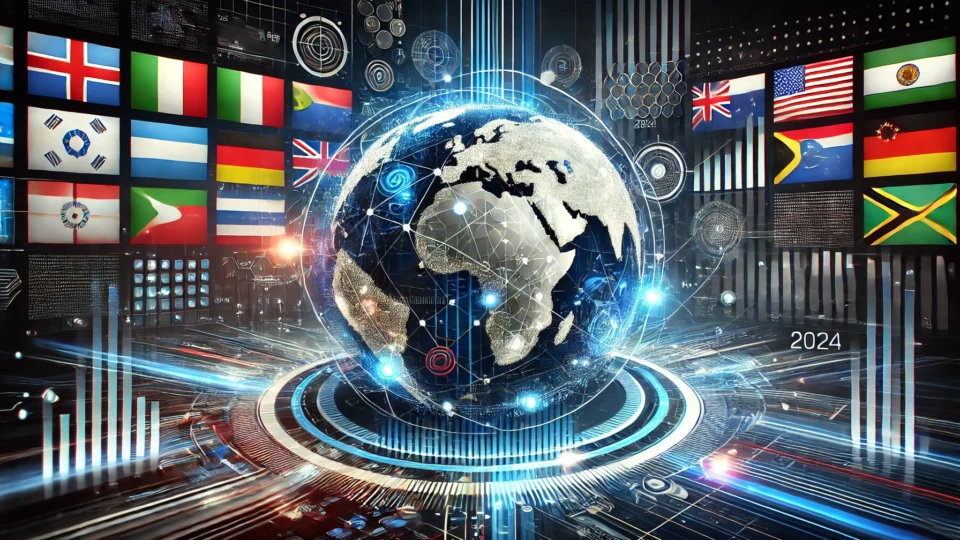Artificial Intelligence (AI) is the defining technology of our era, reshaping industries, economies, and societies. In 2024, nations worldwide are racing to harness AI’s potential, competing to secure their leadership in this transformative field. This article delves into the global AI race, highlighting the strategies, innovations, and policies driving this intense competition.
Introduction: Why AI Dominance Matters
AI is no longer a futuristic concept; it’s a cornerstone of global economic and geopolitical power. Nations leading the AI race gain significant advantages, from technological supremacy to economic growth and national security. As a result, the competition for AI dominance has become a top priority for governments, businesses, and research institutions.
1. The United States: Pioneering AI Innovation
The US remains a global leader in AI development, driven by its robust tech ecosystem and strong private sector. Companies like Google DeepMind, OpenAI, and IBM are spearheading AI research and applications.
- Key Developments:
- AI-driven healthcare systems for precision medicine.
- Advancements in autonomous vehicles and robotics.
- Policy Support: The US government is investing billions in AI research through initiatives like the National AI Initiative Act.
2. China: Scaling AI for Economic Power
China is a formidable competitor, leveraging its vast data resources and state-driven initiatives to accelerate AI adoption. The nation’s Artificial Intelligence Development Plan aims to make China the global AI leader by 2030.
- Focus Areas:
- Smart cities powered by AI for real-time traffic and energy management.
- AI in education, enhancing personalized learning experiences.
- Notable Players: Companies like Baidu, Alibaba, and Tencent are driving innovation.
3. European Union: Ethical AI Leadership
The European Union (EU) is focusing on creating ethical and human-centric AI systems. Its Artificial Intelligence Act is the first regulatory framework aimed at ensuring responsible AI use.
- Key Initiatives:
- Investments in AI for sustainable agriculture and green energy solutions.
- Promoting collaboration between EU nations to compete with US and China.
- Challenges: Balancing innovation with stringent regulations.
4. India: AI for Digital Inclusion
India is rapidly emerging as a key player in the AI race, focusing on using technology for digital inclusion and economic growth. With initiatives like Digital India and AI for All, the government is fostering an innovation-friendly ecosystem.
- Focus Areas:
- AI applications in healthcare, agriculture, and education.
- Leveraging AI for language translation to bridge linguistic barriers.
- Key Players: Startups like Haptik and CureMetrix, alongside giants like TCS and Infosys, are contributing to India’s AI growth.
5. Japan: AI for Society 5.0
Japan is integrating AI into its Society 5.0 vision, focusing on blending technology with societal well-being. The country emphasizes robotics and AI for aging populations and disaster management.
- Key Applications:
- AI in eldercare, including robotic caregivers.
- Disaster prediction systems using AI and big data.
- Notable Companies: SoftBank and Fujitsu are leading AI research and deployment.
6. South Korea: AI in Smart Cities
South Korea is leveraging AI to build smart cities, enhance public safety, and drive industrial automation. Government initiatives like AI for Smart Korea are accelerating AI adoption across sectors.
- Key Innovations:
- AI-powered public transportation systems.
- AI-driven manufacturing for improved efficiency.
- Global Position: South Korea ranks high in AI research output and technological readiness.
7. Middle East: AI for Economic Diversification
Countries in the Middle East, particularly the UAE and Saudi Arabia, are investing heavily in AI to diversify their economies and reduce dependence on oil.
- Key Projects:
- The UAE’s National AI Strategy 2031 to integrate AI into all sectors.
- Saudi Arabia’s AI-powered smart city project, NEOM.
- Focus: Building regional AI hubs to attract global investments.
8. Canada: Fostering AI Research
Canada is a global leader in AI research, thanks to its early investments in deep learning. Cities like Toronto and Montreal are renowned AI hubs.
- Key Strengths:
- Cutting-edge research in natural language processing and AI ethics.
- Collaborative AI projects between universities and tech firms.
- Notable Institutions: The Vector Institute and Mila are at the forefront of AI innovation.
9. Israel: AI for Defense and Security
Israel’s focus on AI is heavily driven by defense and cybersecurity. The nation’s advanced R&D ecosystem is fostering rapid AI development.
- Key Innovations:
- AI-powered surveillance and defense systems.
- Startups developing AI tools for healthcare diagnostics.
- Global Role: Israel is a top exporter of AI-driven defense technologies.
10. The Global AI Race: Collaboration vs. Competition
While countries compete for AI dominance, there is also a growing need for collaboration. International partnerships, ethical frameworks, and shared research are crucial for addressing challenges like data privacy, bias, and AI misuse.
Conclusion: Shaping the Future with AI
The global race for AI dominance is reshaping economies, industries, and societies. As nations strive to lead in this transformative technology, their investments and policies will determine the future of AI and its impact on the world. Whether through innovation, collaboration, or ethical leadership, the AI race is not just about competition—it’s about defining the future of humanity.
FAQs
Why is AI dominance important for nations?
AI dominance provides strategic advantages in technology, economic growth, and national security, making it a key priority for global powers.
Which countries are leading the global AI race?
The US, China, and the EU are at the forefront, with significant contributions from nations like Japan, India, and South Korea.
What role does ethical AI play in the global competition?
Ethical AI ensures responsible use, addressing challenges like bias, data privacy, and societal impact while fostering trust in technology.
How is India contributing to the global AI race?
India is focusing on AI for digital inclusion, healthcare, agriculture, and education, leveraging its large talent pool and startup ecosystem.
What industries are most impacted by AI advancements?
Industries like healthcare, finance, transportation, and defense are being transformed by AI innovations.
How can international collaboration shape the future of AI?
Collaboration allows nations to address global challenges, share research, and establish ethical frameworks, ensuring AI benefits all of humanity.



